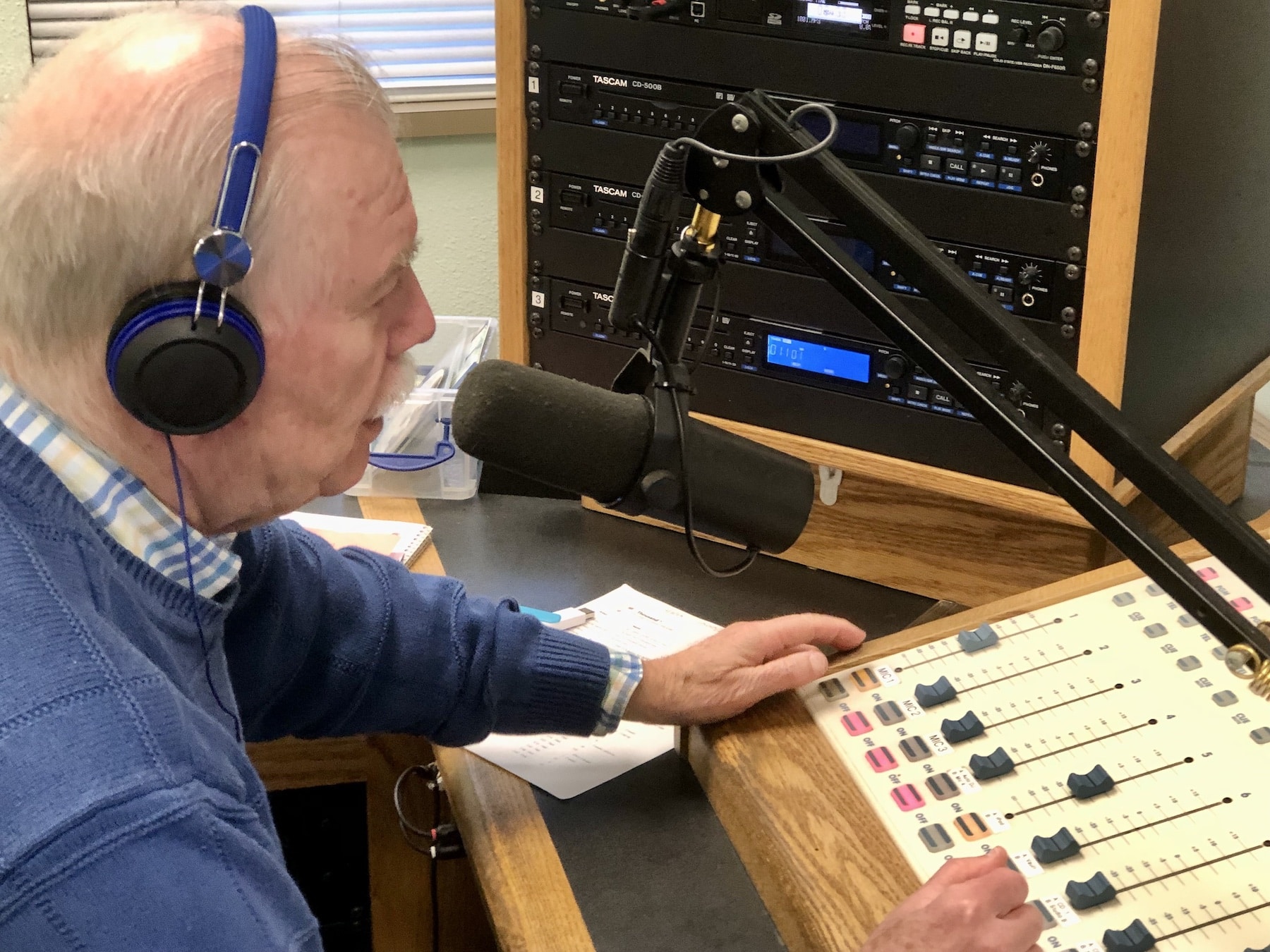Community Education
Newly formed nonprofit wants to adopt school district’s KGHP
A small group of radio enthusiasts has offered to assume management of KGHP-FM, the 36-year-old radio station that Peninsula School District is looking to rehome. A gap remains, however, between the newly-formed nonprofit’s vision for the station and the district’s plans.
In a “next steps” meeting Thursday, Feb. 8, that drew more than 30 attendees, PSD executive director of digital learning Kris Hagel said multiple times that the district has no plans to resurrect the radio broadcasting program that was suspended in 2021.
The district cites dwindling enrollment and lack of interest on the part of students in broadcast media. In addition, said Hagel, the district can’t justify teaching classes unlikely to lead to careers.
The nonprofit Friends of KGHP pushes back on the notion that radio broadcasting is a dinosaur. The group’s three key players, all alums of Peninsula’s broadcasting program, want to see the station remain within the school district.
They’re offering to do the legwork and fundraising to keep it alive, and they advocate a reboot of the instructional program, which they say teaches a broad and highly marketable skill set.
Station’s past and present
KGHP-FM was founded in 1988 by a group of individuals who saw local radio as a potential asset to the community, as a platform for emergency broadcasts and as a vehicle to introduce students to what was then a thriving industry.
The station, whose studio occupies a wing of Peninsula High School, has three towers whose transmissions cover the Key Peninsula and the wider Gig Harbor area, as well as parts of Pierce County south to Joint Base Lewis-McChord. The station added streaming online as that technology became available.

Denny Dale broadcasts his 1,000th show Monday, April 3, from the radio studio at Peninsula High.
By 2021, when longtime instructor Leland Smith retired, enrollment was a small fraction of what it was in decades past, Hagel said. The district decided to sunset the broadcasting program but keep KGHP on air.
Still alive and kicking
Student-hosted broadcasts are now a thing of the past, but the station remains home to several longstanding programs hosted by volunteers like Denny Dale, aka DJ the Deejay, who has sat behind the mic for more than 20 years for his “Rock and Roll Connections.”
Last spring, budget cuts led to the lay-off of longtime station manager Spencer Abersold. Volunteers, including Dale and other program hosts, scrambled to keep the station operating.
Dale at Thursday’s meeting reported that KGHP is back on track, with live shows, 24/7 automated programming and a new feature, community service announcements every 15 minutes highlighting local organizations and events. Live broadcasts of high school sports are still going and are one of the station’s more popular features.
Friends of KGHP
The district last fall signaled its interest in off-loading the radio station to an entity willing to operate it for benefit of the wider community. Because of FCC licensing requirements, the group would have to be a nonprofit or educational entity.
A preliminary meeting in November, like Thursday’s gathering, drew a large crowd of KGHP supporters. Among them was Peninsula High School alum Ty Rosenow (Class of ‘93), who was active in KGHP. Now living in Tumwater and working for the state’s health services department, Rosenow hosts the K-Ty Radio Network, “your source for World pop music.”
Rosenow dug into his own pocket to the tune of around $800 to establish nonprofit status for Friends of KGHP, and he sent a letter of interest to the district about transfer of the FCC licensing.
Rosenow was recently joined in his endeavor by two fellow KGHP alumni. Jeremy Larcom of Gig Harbor (PHS Class of ’92) has had a career in radio, working as everything from a DJ to executive producer for a satellite network. Shelly Honeysuckle of Tacoma is revamping a station she started some time back and is helping resuscitate KGRG, owned by Green River College in Auburn, which is facing similar woes as KGHP.
A public Facebook page Friends of KGHP has a small but growing number of followers. The group is seeking people willing to serve on its board, Larcom said.
Broadcast jobs not trending well
At Thursday’s meeting, Hagel reviewed the station’s history. He reiterated the district’s stance that, while KGHP is seen as a valuable community asset, the notion of reviving classes in broadcasting is not on the table.
Broadcasting was funded by the state as a career and technical education (CTE) class. The money comes with strings attached, Hagel said. “Besides the fact that kids are not signing up for class, one of the things that we’re required by the Office of Superintendent of Public Instruction for a CTE program, is to show that there is a skills gap in the market and this program is going to provide jobs that the market needs.”
Hagel cited the website Career One Stop to show that careers in broadcasting are on a downward trend.
“I want to be pretty clear. This is not a program that we have budget for moving forward,” Hagel said. “And that’s kind of why after the last meeting, I asked people to kind of come together. So, let’s look at what other solutions are available to us.”
A difference of opinion
Larcom said the district’s position was shortsighted because it only looked at the job of DJ, not the other aspects of running a station that include transferable skills and broad career skills like troubleshooting and problem-solving.
“If I look at this and I was doing the research on this I would give you a failing grade because it shows that you don’t understand the comprehensive nature of broadcasting,” Larcom said. “I’ve had some experience and friends who are involved in broadcasting and they’re involved in marketing, they’re involved with programming, they’re involved with production. … I’ve lived that life. I’ve had that career … and it was a really fulfilling career.”
Other KGHP supporters spoke up, calling the district-owned station “a treasure,” a rare “gem.”
Katie Harrison, mother of a 2018 PHS graduate now in Air Force intelligence, said her son blossomed in the program.
“He was the kid who didn’t have many friends. And suddenly I saw his shyness fall away, and there’s quiet confidence,” she said. “He walks into a room with full-bird colonels, and he says he draws back on his time on the radio and the confidence that it gave him to speak.”
Harrison elicited loud applause by concluding: “I think instead of saying ‘no’ or ‘we can’t’ or ‘it doesn’t work,’ we say, ‘How do we make it work? How do we find the money? How do we find the interest?”
Hagel assured that the school district doesn’t want KGHP to die. He said Peninsula is open to partnerships whereby students who are interested could serve internships at the station under community mentors. But he made it clear the district wasn’t budging in its resolve to find KGHP a new home.
“We haven’t had a radio program in five years now, and this conversation is unfortunately not going to be successful if we’re going to try and reinstitute a radio program, because at this time, that’s not where the district is looking,” he said.
Is anyone listening?
Hagel in his presentation addressed some of the questions raised by proponents of keeping KGHP under the district’s umbrella, like “has the district surveyed the number of listeners?”
The answer is “no,” Hagel said, because an assessment of terrestrial station listener coverage by Nielsen is prohibitively expensive, around $80,000. The number of listeners tuning in online is dismal, he added. Since Jan. 1, it’s been averaging eight users per day who listen for 15 minutes or more and 67.8 sessions overall per day.
Larcom and others challenged Peninsula School District to look at Mercer Island School District and Nathan Hale High School in Seattle for examples of district-owned, student-run radio stations that are thriving in the 21st Century.
“Our community is a different community from Mercer Island,” Hagel said. “We have different kids here. These kids have told us over and over, we don’t want this program. We’re not signing up.”
“That’s a circular argument,” Larcom countered. He said the kids don’t sign up because there’s no program to sign up for, but at Mercer Island, “it’s the class everybody wants to get into.”
Asked if the district would consider repackaging broadcasting within a comprehensive program that includes video production, podcasting and the like, Hagel said it’s been considered. Kids are interested in E-sports (competitive online video gaming), he said, and the district may in the future tailor its audiovisual programming to fit that lens.
Station’s operating expenses
Hagel reported that the cost to operate the station (now without a manager) is this year around $6,400. In 2022-23, the cost was just more than $82,000, most of it Abersold’s salary and benefits.
The district contracts with an engineer to operate the station’s equipment, which Hagel reported is functioning and in good repair. Hagel said the value of KGHP’s equipment “on the open market” is around $100,000, but the district isn’t looking to make money on any transfer, district officials have said.
In other operating costs, the district pays for software licensing, technology supplies and communications costs for streaming services.
Rosenow’s group expects they will be able to cover KGHP’s operating expenses through donations, grants and sponsorships. Others at the meeting suggested the community would come through generously for KGHP.
“How can we help with fundraising?” asked Kirsten Knapp. “We’ll do whatever it takes.”
Student survey coming
Wrapping up the meeting, Hagel agreed to a suggestion that the district survey students on their thoughts about the radio station. Friends of KGHP welcome the survey.
“I’m for it,” said Rosenow. “At least it will bring some sort of awareness there is a station.”
The group has requested a meeting with district officials, to which Hagel agreed toward the end of February.
Asked after the meeting to comment on the apparent divide between Friends of KGHP and the district’s vision, Hagel emailed this statement:
“The KGHP radio station is an asset for this community. One we would prefer to see stay in the community, but also something that is not in the best interest of taxpayers for us to continue to fund when it is not used toward the education of our students.
We are entertaining all conversations at this time and exploring every option that comes in front of us. We are hopeful to see a community organization come forward, whether that is the one at the meeting or others who may be interested. We will work with anyone to make KGHP a community asset for years to come. Until then, we will do our best to partner with our amazing volunteers to keep KGHP functional and on the air.”

